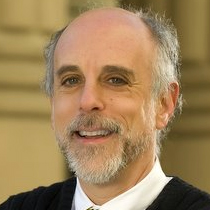
How can finding positive things to focus on help with recovery after brain injury?
One of the things that comes with being human is a tendency to worry or focus on the negative. And one of the things that we do here is use a form of therapy called cognitive behavior therapy and we help people to understand that, while it may be easy or may come naturally to focus on the negative, it has the potential to make things worse after a brain injury.
What we try to help people do is instead to recognize the positive things in the other person. And it’s really hard to do because many people are overwhelmed by fear, anxiety, depression, and feelings of hopelessness, but we try to help people recognize their feelings and then really, really focus on the positive.
And we ask people questions. Questions can sometimes be very powerful tools. For example, we might ask a wife, "What kinds of things do you see in your husband now that are familiar and recognizable? What traits does your husband have now? What qualities does he have now that he had before?" And I will tell a lot of spouses that I meet that there are often changes in people after brain injury that are positive; so for example, the husband who was never at the kid’s ball games, never at the soccer games, never home for dinner after work might have a lot more free time and have a lot more time to spend with the children.
The person who was really intense before and difficult to get along with might be very patient and understanding now. So I can say with all honesty, and I do say to spouses, that many people change for the better. And the other thing that we tell spouses is that while the injury that happened was very sudden and unexpected, ultimately over time, if people are patient, things will become more predictable and more understandable and people will adapt.
About the author: Jeffrey Kreutzer, PhD
Jeffrey Kreutzer, PhD a Professor of Physical Medicine and Rehabilitation, Neurosurgery, and Psychiatry at VCU. He serves as Director of Virginia's TBI Model System, a position he has held since 1987. He also coordinates VCU Health System outpatient services for families and persons with brain injury.


Comments (4)
Please remember, we are not able to give medical or legal advice. If you have medical concerns, please consult your doctor. All posted comments are the views and opinions of the poster only.
Rosemary replied on Permalink
My husband fell at work late one time after a snow storm and ice on the ground. Dissected the right vertebral artery and had a stroke in Jan of 1997. He never did recover from that and it has been well over 25 years. Now he has dementia and parkinson like symptoms. Since then he has been on a lot different meds since that time.
Kathy replied on Permalink
My son had a brain tumor 15 years ago but still struggles with emotional issues related to staying positive. All of the comments you make in this article are spot on to what we deal with on a daily basis. He really could benefit from a type of group therapy that deals with people with TBIs. It's very different than other types of therapies. As a family we really need help trying to find someone in the state of Washington, Olympia area, that can help him to reenter the world on a more positive note. If you could give us any suggestions, it would be much appreciated.
Dave Eubank replied on Permalink
It's pretty simple. I spent 11 hrs. under the knife in reconstructive brain surgery as the result of a #5 brain aneurysm. I was I8 months post-operative and the stigma associated with a clinically proven brain injury was not going away but instead of saying, "Why me?" I said, "WHY NOT ME!" I realized I could not change people; I could not make them feel my feel or feel my hurt The only thing I could do was change myself and when I changed myself? I changed the perception of how others perceived me. Whether that's good or bad, it's worked out pretty good for me. A T.B.I. survivor is scarred for life and even though it may not be the kiss of death, there is a distinction and it is not a real good one. I speak with survivors on my thoughts on recovery and although I can not change their condition, I can change their attitude about that condition and I like it.
Lucinda replied on Permalink
Dave, Your the exception because its very difficult for me especially when I saw different people having a meltdown at 1 support group and this was a trigger for me.
It felt good the first few times but gaining the courage because I was around loud, obnoxious people and many people have poor listening and communication problems, I'm talking about people who don't have a brain injury and trying to explain to people when I was calm when many weren't even listening to me. This includes being told to call different places because many didn't want to take the time to fill out paperwork and many people still don't understand tbi's or strokes including people working at the hospital.